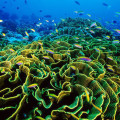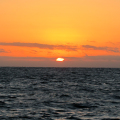Losing the Big Blue
Tim Hall | June 18, 2012.
Rio+20 needs to urgently address the crises of pollution and overfishing in order to save our oceans, say major NGOs and scientists.
Speaking at the UN Conference on Sustainable Development in Rio de Janiero, Greenpeace along with marine scientists from across the world urged nations to pursue immediate action and show ambitious leadership in order to rescue the oceans.
“We’re plundering the oceans of fish, choking them with pollution and altering them forever with the impacts of climate change,” said Greenpeace oceans campaigner, Richard Page.
Greenpeace, along with several other NGOs and scientific groups, are demanding governments at Rio+20 agree to an ‘Oceans Rescue Plan’ that will ensure a healthy marine environment and sustainable fisheries for the benefit of people today and for future generations.
They said the threat to the oceans does not just have environmental consequences, but serious social and economical consequences as well.
“It’s estimated the loss of marine ecosystem services could cost up to $2 trillion a year by 2030,” said marine scientist Tony Haymet.
“In one study, it was shown the cost of ocean acidification from absorbed CO2 near Oregon threatens a $278 million oyster industry, and of course the livelihoods attached to it,” said Haymet.
The calls for action also gained support from the Zoological Society of London (ZSL), who released a report describing government action to protect oceans and meet existing pledges as “pitiful”.
“Rio+20 might be our last real chance to save ocean ecosystems and make sure we can manage marine fish stocks in a sustainable way,” said ZSL’s marine policy officer Liane Veitch.
Currently, negotiations are stalled over the actions that should be taken over international waters and agreeing on the equitable use of the ocean’s genetic resources.
The United States is holding its position against sharing ocean genetic resources equitably; in response developing nations won’t supported protected areas in international waters.
The demands set out by Greenpeace and ZSL include immediate negotiations towards an agreement on protected marine areas in international waters; along with the elimination of fishing subsidies, which can promote overfishing and unregulated fishing, by 2015.
The demands come on the heels of Australia establishing the largest network of marine reserves in the world. The Australian announcement means approximately one-third of Australia’s territorial waters, including the ecologically rich Coral Sea, are now legally protected zones — a total of 3.1 million square kilometres of ocean.
By Tim Hall, photo by Linh Do.












comment